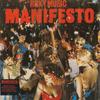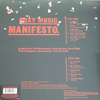



Roxy Music - Manifesto (Half-speed Mastering)
[click here to see more vinyl by Roxy Music]
Bryan Ferry – vocals, keyboards, harmonica
Melissa Manchester – backing vocals
Andy Mackay – oboe, saxophone
Phil Manzanera – electric guitar
Paul Thompson – drums
Alan Spenner – bass
Paul Carrack – keyboards
Gary Tibbs – bass
Steve Ferrone – drums
Rick Marotta – drums
Richard Tee – piano
Written by Bryan Ferry (all tracks), Andy Mackay (A3), Phil Manzanera (A1-2, A4, B2)
1 LP, standard sleeve
Original analog Master tape : YES
Half-speed Mastering
Heavy Press : 180g
Record color : black
Speed : 33 RPM
Size : 12'’
Stereo
Studio
Record Press : Optimal Media GmbH
Label : Republic Records
Original Label : EG Records
Recorded 1978-1979 at Ridge Farm (Rusper, England) and Basing Street (London)
Recorded by Rhett Davies
Engineered by Jimmy Douglass, Phill Brown, Randy Mason
Produced by Roxy Music
Remixed and remastered at Atlantic Studios
Lacquer cut by Miles Showell at Abbey Road Studios
Originally released in March 1979
Reissued in June 2022
Tracks:
Side A:
- Manifesto
- Trash
- Angel Eyes
- Still Falls The Rain
- Stronger Through The Years
Side B:
- Ain't That So
- My Little Girl
- Dance Away
- Cry, Cry, Cry
- Spin Me Round
Reviews :
“Manifesto is the band’s first release since it broke up after the obligatory lousy live LP in 1976. Though far more interesting than most such sets (Who can forget the Byrds’ numbing 1973 reunion album? Who can remember a thing that was on it?), it offers only embellishments on the Roxy sound and story. The new record is a lovely footnote, but it can lead nowhere.
That sound and story deserve a footnote: both were among the most glorious and eccentric of the Seventies. The band — especially guitarist Phil Manzanera, saxophonist Andy Mackay, drummer Paul Thompson and Eddie Jobson (missing on Manifesto) on synthesizer — produced railing hard rock or smoky dreamscapes; always the musicians played with precision, individuality and intelligence. Bryan Ferry sang as if he never noticed there was anyone behind him, so lost was he in a strange, abandoned theater of heartbreak, desperate longings and general post-Great Warangst. Roxy Music made it all funny and stirring at the same time, storming through Stranded and finishing up with Siren. Siren was perhaps the most perfectly crafted album of the decade, as well as Ferry’s heart-on-his-sleeve break with the cynicism of the confused hustler’s persona he’d carried so long.
Manifesto is bits and pieces of all that. The songs ending each side fade out with real grace and leave you hanging, wanting more — drenched in a romance out of reach. “Still Falls the Rain” is a quiet, forgiving ballad in the purest Roxy style, full of tiny touches that occur only once, teasing you to wait for a repetition that never comes. Manzanera’s four little notes, almost buried in the distant band sound, underline Ferry’s emotion: those notes are as surprising as anything Manzanera’s ever played, and they carry as strong an echo. “Cry, Cry, Cry” is a horrible piece of old-fashioned soul, and yet, as “Spin Me Round” takes over and closes out the set, you forget all about the mistakes and drift away, just like Dobie Gray said you could.
So the record has its moments — moments few bands even know about — but as with the brazenly (and meaninglessly) titled “Manifesto,” they add up to little. Ferry announces he’s for the guy “who’d rather die than be tied down”; he’s rarely traded on such banality, and he mouths the lyrics as if he hopes no one will hear them. The sound may be alive, but the story is almost silent.
It’s not that Ferry has given it up. He began making solo albums long before Roxy called it a day — starting with his outrageous collection of oldies covers, These Foolish Things, and continuing through last year’s astonishing The Bride Stripped Bare — and on those LPs, the tale of a man struggling to find himself behind his mask, and a lover behind hers, goes on. It’s a tale couched in melodrama but driven by terror and compassion: what it has is the intensity Manifesto never reaches for.
Manifesto betrays no pandering to nostalgia, but on it, Bryan Ferry looks back to old loves, remembers fondly, accepts what he cannot have: he feels safe from the hope those loves stood for, from the dangers of the lust they summoned. As in “Still Falls the Rain,” this is a shining conception, and the people this state of mind calls up come to life in the music. But like Manifesto itself, such a respite can be no more than a respite, a holding action. The struggle is merely out of sight, and on Ferry’s own records, I’d imagine, that struggle will soon be back on center stage.” Greil Marcus, Rolling Stone, October 2002
“Returning to action after four years of solo projects, Roxy Music redefined its sound and agenda on Manifesto. More than ever, Roxy sounds like Bryan Ferry's backing band, as the group strips away its art rock influences, edits out the instrumental interludes in favor of concise pop songs, and adds layers of stylish disco rhythms. Although the songwriting is distressingly inconsistent, there are a number of wonderful moments on the record, particularly in the sighing "Angel Eyes" and the heartbroken "Dance Away." Still, trading sonic adventure for lush, accessible disco-pop isn't entirely satisfactory, even if it is momentarily seductive.” AllMusic Review by Stephen Thomas Erlewine
Half-speed mastering. In half-speed mastering, the whole process is slowed down to half of the original speed. A typical 33 1/3 rpm record is cut at 16 2/3 rpm. The source material is also slowed down (reducing the pitch in the process) meaning the final record will still sound normal when played back. Slowing the whole process down allows more time, which means the end result sounds better and is more efficient — allowing engineering to minimize the effects of inherent limitations within the vinyl format. The result is a more accurate and more open high-frequency response in the half speed vinyl when compared with a normal speed recording.
Ratings :
AllMusic : 3 / 5 , Discogs : 4.5 / 5



